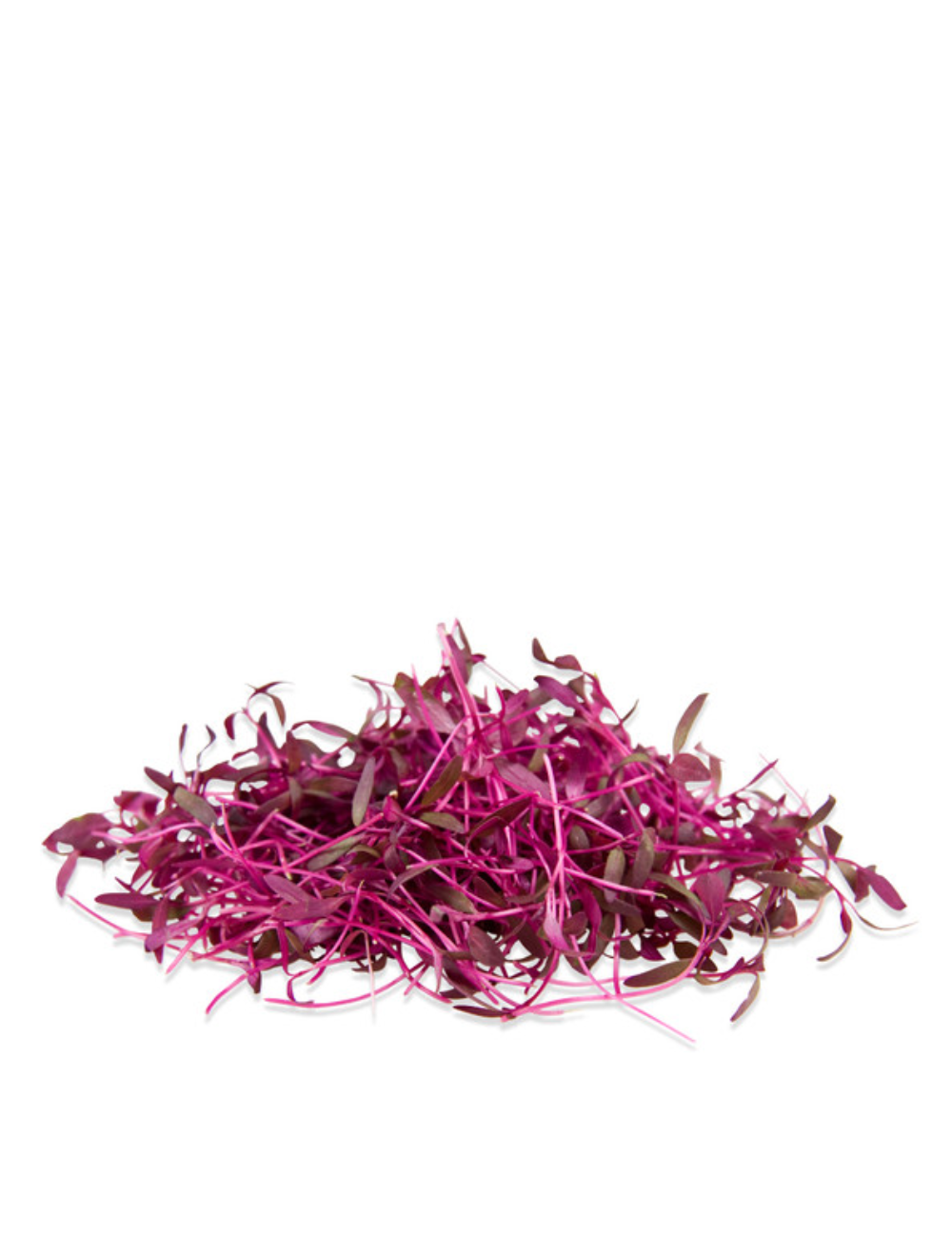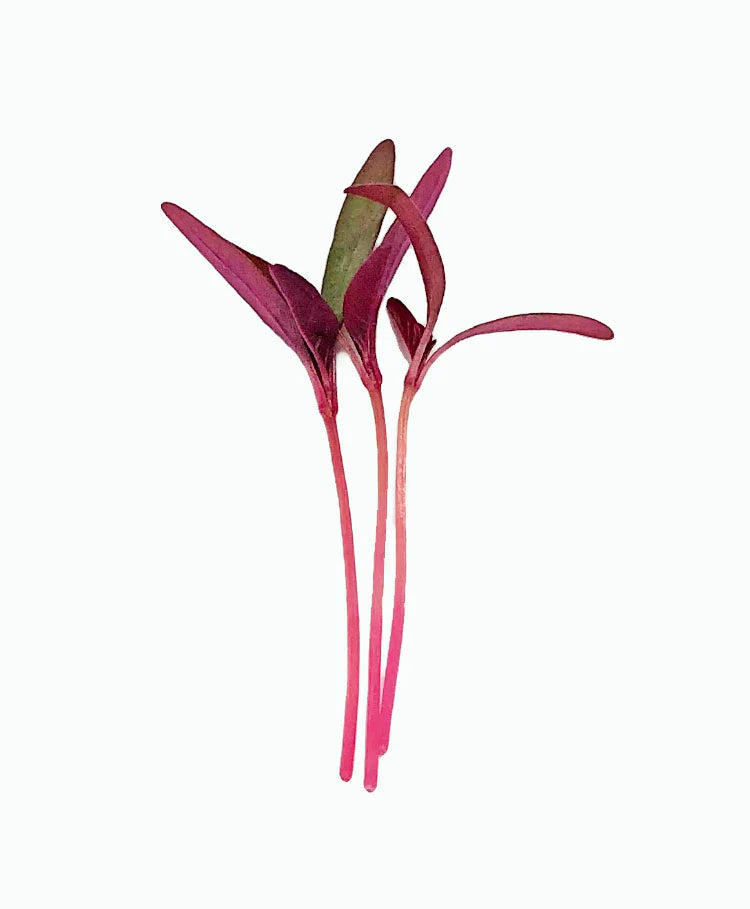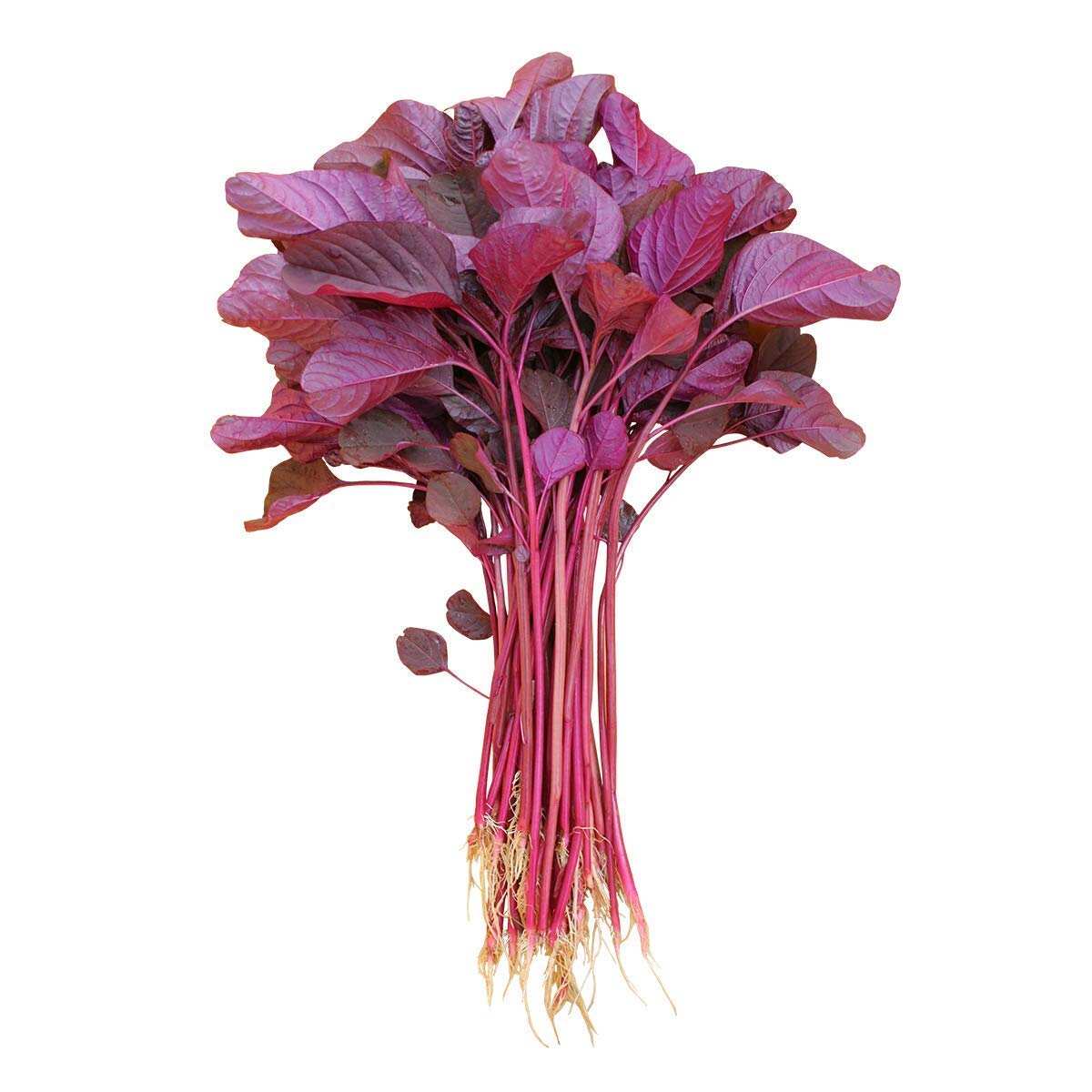Amaranth Microgreens, Red Garnet, Non-GMO, 20g
Amaranth Microgreens, Red Garnet, Non-GMO, 20g
Mildly earthy, yet reminiscent of beets, with just a bit of sweetness and spiciness to them.
Nutrition
Nutrition
Phosphorous:
Phosphorus is an element responsible for energy storing in your body. It aids your kidneys in filtering out waste, it creates DNA and RNA, and it even helps reduce your pain when you overdo it with exercise! Want strong teeth? The phosphorus in amaranth will help!
Manganese:
You can find over 100% of the recommended daily allowance of manganese in a serving of amaranth. This will help you with bone health and regulating your blood sugars. A powerful anti-inflammatory, manganese also helps to reduce epileptic seizures. Helps to create and activate enzymes in the body. These enzymes do a variety of things including breaking down or digesting food.
Folate:
Folate or folic acid, a vitamin that most people don’t get enough of, is found in amaranth. Folate is vital in creating new cells, an especially important vitamin for pregnant women.
Selenium:
Although you might not have heard of selenium, this element has been busy at work on your body, helping your immune system, preventing heart disease, and aiding in mental decline. Eating amaranth microgreens offers the powerful antioxidant that can keep your systems in top-notch condition.
Magnesium:
If you are suffering from premenstrual anxiety, depression, or migraines, getting more magnesium into your diet is a great idea. The anti-inflammatory properties will ease both your mind and body.
Iron:
Iron aids many systems of the body. Your gastrointestinal processes will run smoother if you have enough iron. It also helps your immune system, your energy levels, and your focus. Another important job of iron is to regulate your body temperature.
Zinc:
Zinc helps your immune system and metabolism work well, and aids in your body’s ability to heal wounds. It even helps your sense of taste and smell to work properly!
Copper:
Copper works in conjunction with iron to form red blood cells and assists your body in creating healthy bones, blood vessels, and nerves. Copper also staves off cardiovascular disease and osteoporosis.
Vitamin C:
Amaranth is a good source of Vitamin C, which reduces the oxidative stress in your body. Oxidative stress is linked to chronic disease. Vitamin C also keeps dementia at bay, fights inflammation, and protects your immunity. Vitamin C helps protect and maintain the body’s cells; promote healthy skin, blood vessels, cartilage and bones; and helps to heal wounds.
Protein:
Protein is essential for muscle mass and strength, both of which help your body to run more smoothly. It boosts metabolism while lowering blood pressure. Additionally, protein helps you maintain weight loss and repairs tissues.
Fiber:
Getting adequate fiber in your life aids in weight loss lowers cholesterol and regulates blood sugar levels. It is also very important for bowel health.
Amaranth microgreens offer a plethora of health benefits, and they touch on all of your major bodily systems. Keep in mind that the microgreen form of vegetables like amaranth actually offer more vitamins and minerals than their full-grown counterparts.
Recipe Ideas
Recipe Ideas
Red amaranth microgreens are regularly eaten in several different ways. Perhaps the most popular way of eating them is in a salad or by adding them to burgers and sandwiches.
Another common way to eat these microgreens is as a garnish on just about anything you make.
Just keep in mind that cooking them causes up to 50% of the nutritional value to disappear.
Here’s a few recipe ideas on how to use amaranth microgreens.
Honey Amaranth Smoothie
Sweet amaranth microgreens pair perfectly with raspberries, peaches, and blueberries for a tasty smoothie (via Sprout Organic Farms).
Citrus Seared Scallops
Brighten up this seared scallops dish with a splash of microgreens (via Spoon Fork Bacon).
Roasted Pear Soup
Top off this roasted pear soap with ginger with some fresh, dazzling microgreens (Ciao Florentina).
Microgreens Salad with Quinoa, Pancetta and Pomegranate
We think garnet amaranth microgreens would be the perfect thing to complete this flavorful and healthy salad (via Garlic Girl).
Couldn't load pickup availability



Amaranth Microgreens: A Nutrient-Dense Boost for Your Health
In the world of microgreens, Red Garnet Amaranth stands out as one of the most nutrient-rich options available. According to a 2012 study conducted by the University of Maryland in collaboration with the USDA, researchers analyzed 25 microgreen varieties for key vitamins—specifically vitamins A (beta-carotene), C (ascorbic acid), E (tocopherols), and K (phylloquinone).
Red Garnet Amaranth ranked among the top four microgreens with the highest concentrations of these essential nutrients, alongside red cabbage, cilantro, and green daikon radish. What’s more, Amaranth led the pack with the highest antioxidant capacity, making it a powerful ally for supporting immune health, reducing inflammation, and promoting overall wellness.
With its vibrant color and exceptional nutrient density, Amaranth microgreens aren’t just a garnish—they’re a true superfood in miniature form.

Vitamin K
Amaranth contains a huge amount of vitamin K in one serving—it contains 950% of the Daily Value based on a diet of 2,000 calories a day! Vitamin K plays a vital role in blood clotting which speeds up the time of wound recovery. Vitamin K also contributes to healthy bones. Adequate vitamin K content can be difficult to come by in most diets.


